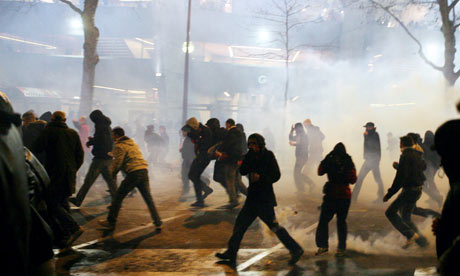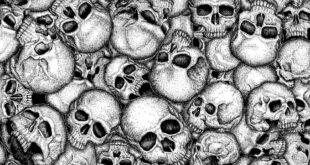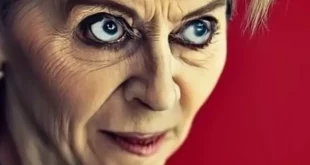FrontPage Mag
January 6, 2014

The French city of Marseille has an estimated 30 to 40 percent Muslim population and has been ranked as the most dangerous city in Europe.
The gritty Mediterranean port, France’s second-largest city, was appointed the “cultural capital of Europe,” a rotating European Union honor. City fathers launched beautification projects, created new tourism attractions and invited people from around the world to visit. A splendid stone esplanade was laid around the Old Port, peppered with novel sculpture, and a high-tech historical museum went up next to City Hall.
How did that work out?
The eruption has refocused attention on Marseille’s long-standing reputation as a European drug-smuggling hub, a place where entire neighborhoods have slipped away from police control and fallen under the command of gangsters who earn millions importing and selling North African hashish and settle turf disputes with AK-47 assault rifles.
“Marseille is sick with its violence,” Interior Minister Manuel Valls said.
Vowing to squash the drug trade and end the violence, Valls last week dispatched 250 paramilitary and other national police officers to reinforce the usual deployment of around 3,000. The night after they were deployed, with television cameras in tow, another body was found, burned to a crisp with a bullet in its charred skull, the execution method local traffickers call the “barbecue.” The next day, two Turkish immigrants were shot and wounded, and a pair of youths driving by on a motor scooter opened fire with a pistol on a third man, wounding him in the legs.
Marseille doesn’t have a violence problem. It has a Muslim immigrant problem.
In September 2011, at between 4 and 5 am, around 15 people “apparently in a state of drunkenness” broke into the barracks belonging to a military fire service, shouted at the firemen on duty there then began firing shots at them. 7 firemen were wounded, of whom 4 were taken to hospital. The party of “jeunes” had apparently come from a bus chartered by a group of Cape Verdians in Nice to travel to an “Africa night” in Marseilles.
A week later, a bus driver was attacked by passengers when he refused to allow two burka-clad women to travel on his bus. It is illegal in France to wear the burka in public. When one of the women tried to board the bus, displaying a bus pass bearing a photograph, the driver insisted that she unveil so he could verify her identity. She refused to do this and, after some discussion, decided to leave and wait for the next bus.
Angry passengers (“jeunes”) then took the side of the women and beat up the driver, accusing him of being a “racist”. They then invited the burka-wearing woman to re-enter the bus. But when the police arrived, they scattered. Police booked the woman for wearing a burka.
In reacting to the incident, the president of the Marseilles Transport Authority, which operated the bus, appeared to sympathise with the woman rather than, as might have been expected, his own driver. The driver’s reaction was “inappropriate”, he said. The explanation comes with this “president’s” name: Karim Zéribi.
Muslims have now set up unofficial checkpoints in various parts of Marseilles. Anyone entering “their” area has to stop and submit to inspection. Last week, the driver of a van belonging to a food bank, which distributes free food and drink to poor people, was stopped by a group of “jeunes” when trying to enter the Marseilles district of “Air-Bel”. The road had been barred with concrete blocks and bins filled with sand. They searched his vehicle “like policemen applying the law in their territory” in order to “check there weren’t any policemen inside”. When they saw he only had milk, they let him pass through.
This is what a real No Go Zone looks like. As I wrote last year, Marseilles is on track to becoming France’s first majority Muslim city.
Muslims had attacked the port city in the 9th century capturing it and enslaving its native inhabitants. That which Muslims once took, their theologians insist is theirs in perpetuity. The Muslim return to Marseille is seen as a reconquista, a return to the land that was once theirs.
Nearly half of all immigrants to France are Muslim. In Marseille 41.8 percent of those under 18 were of foreign descent.
La Marseillaise, France’s National Anthem, got its name when volunteer revolutionaries from Marseille sang the song. Now Marseille is at the center of a new revolution. The Islamic Revolution. Muslim volunteers from France have been identified training with the Taliban and after Mohammed Merah’s massacre at a Jewish school, a group of Jews in Marseille were attacked by Muslim men shouting, “Vive Mohamed Merah, F— the Jews, Palestine will win.”
This is what happens when the cultural capital of Europe meets Muslim immigration.
 Daily Stormer The Most Censored Publication in History
Daily Stormer The Most Censored Publication in History


